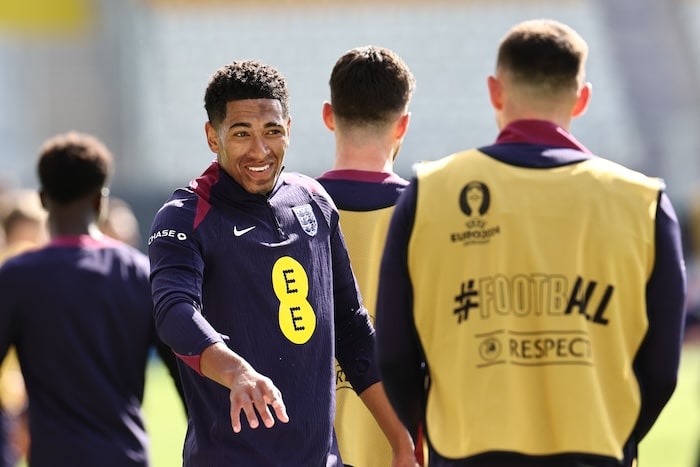Twenty-four teams will vie for European Championship glory in Germany from 14 June to 14 July, writes Mark Gleeson.
It was not even that long ago that Germany were perennial contenders and frequent winners of major competitions.
But their most recent World Cup success in 2014 has been followed by two tournaments, in Russia and Qatar, where they could not get past the first round, something that had only previously happened in 1938.
Similarly in the Euros, Germany floundered during the most recent tournament, exiting in the round of 16, having thrice previously been winners, and runners-up on another three occasions.
Last year, when their warm-up results were going awry, the Germans took the unprecedented step of firing a coach, with Hansi Flick booted and Julian Nagelsmann brought in as a stopgap measure.
Whether the youth coach proves a panacea or a disappointing flash in the pan, as his previous tenure at Bayern Munich suggests he might be, remains to be seen.
Instead, the favourites for the Euros will be England, France, Portugal and Spain, with the Dutch and Belgians being credible outsiders. Portugal will likely bring Cristiano Ronaldo with them for a swansong.
He will make his sixth Euro finals appearance already holding records for the most goals (14) and appearances (25) at the tournament.
But this is a tournament tailor made for the new generation of world stars – Kylian Mbappé, Jude Bellingham, Phil Foden and teenager Lamine Yamal from Spain.
It all gets underway in Hamburg on June 14 and concludes one month later with the final in Berlin.
GROUP A
GERMANY: This year’s hosts open the tournament against Scotland in their first competitive fixture since the 2022 World Cup in Qatar where, despite beating Costa Rica 4–2 in their final group game, they crashed out at the first hurdle.
HUNGARY: After going 44 years without qualifying for a Euros finals between 1972, when they finished fourth, and 2016, Hungary have now made it to their third tournament in a row.
SCOTLAND: They have qualified for back-to-back tournaments but have not won a game at the tournament since Euro ’96 in England.
SWITZERLAND: Their stand-out performance came in 2020, when they progressed through the group stage and stunned the French on penalties in the round of 16 before a quarterfinal exit at the hands of Spain, also on spot kicks.
GROUP B
ALBANIA: They made their debut at Euro 2016 and memorably defeated Romania 1-0 in their last group game, and this is their second appearance.
CROATIA: Captain and talisman Luka Modrić could feature in his ninth major international tournament for the World Cup semifinalists, who were eliminated during the round of 16 in their most recent two Euros finals appearances.
ITALY: The title-holders (right) started their campaign under Roberto Mancini but ended it off coached by Luciano Spalletti as they came close to missing out on the tournament.
SPAIN: Only Germany have taken part in more Euros finals than Spain (top), who will this year be making their 12th appearance at the tournament.
GROUP C
DENMARK: Coach Kasper Hjulmand’s experienced squad reached the last four at Euro 2020, their best showing at any finals since they famously won the competition in 1992.
ENGLAND: Manager Gareth Southgate will be hoping to go one better than last time, when the Three Lions lost the Euro 2020 final to Italy on penalties at Wembley.
SERBIA: With an impressive squad containing the likes of Dušan Vlahović from Juventus, Fenerbahçe’s Dušan Tadić and AC Milan forward Luka Jović, Serbia will have high hopes of making an impression.
SLOVENIA: Formerly part of Yugoslavia, Slovenia are at a major international tournament for only the fourth time, the first time since the 2010 World Cup.
GROUP D
AUSTRIA: This is Austria’s third successive Euros and their fourth in total; they co-hosted the 2008 competition, their tournament debut, with neighbours Switzerland.
FRANCE: The two-time winners have not missed a finals tournament since 1988 and were hosts in 2016, when they lost to Portugal in the final.
NETHERLANDS: Ronald Koeman is in his second spell as coach of his nation (below), having won the tournament as a player in 1988.
POLAND: Michał Probierz’s side came through the playoffs in March to qualify, booking their passage with a shootout victory against Wales after 120 goalless minutes in Cardiff.
GROUP E
BELGIUM: The Red Devils were quarterfinalists at the past two Euros but failed to progress from the group stage at the 2022 World Cup finals.
ROMANIA: They will be hoping to repeat their heroics of Euros 2000, where they progressed from a group containing Portugal, England and Germany before being knocked out by Italy in the quarterfinals.
SLOVAKIA: They qualified for their third consecutive Euros finals, with their best performance coming in 2016, when they progressed to the round of 16 before being beaten by Germany.
UKRAINE: Serhiy Rebrov’s team beat Bosnia and Herzegovina and Iceland in dramatic playoff games to secure qualification for their fourth Euros in a row.
GROUP F
CZECH REPUBLIC: The Czechs have reached the quarterfinals (twice), semifinals and final in the past seven editions as they bid for a repeat of their Antonín Panenka-inspired triumph of 1976.
GEORGIA: Willy Sagnol’s charges made history in the playoffs, defeating Luxembourg and Greece, the latter on penalties, to reach their first-ever major finals.
PORTUGAL: They were the only team (above) to qualify for the event with a 100% record.
TURKEY: They have been knocked out in the group stage in their last two appearances but memorably made it to the semifinals in 2008, when they lost 3–2 to Germany in a thriller.
Photo by EPA/ANNA SZILAGYI





